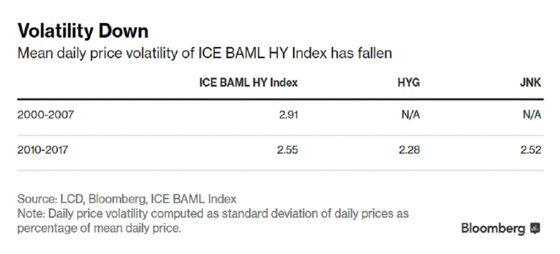Study Finds No Link Between ETFs and Your Junk-Bond Drama
Study Finds No Link Between ETFs and Your Junk-Bond Drama
(Bloomberg) -- The spectacular growth of high-yield credit ETFs is likely affecting the cash bond market in any number of ways, but not by making it more volatile, a new study argues.
Swings in the market haven’t grown any more dramatic since the financial crisis as trading and assets in junk-bond ETFs have swelled, according to Marty Fridson, chief investment officer at Lehmann Livian Fridson Advisors LLC. In fact, in the seven years through 2017, junk ETFs have been less volatile than the cash market itself, which works against the notion that fund jitters are feeding into the underlying assets.
Fixed-income ETFs -- which hold $627 billion in the U.S. -- have prompted criticism that they’re doing everything from creating bubbles in underlying credits to driving volatility in bonds. From Mohamed El-Erian of Allianz SE to Guggenheim Partners’ Scott Minerd, investors have pointed to ETFs as a potential destabilizing influence that could exacerbate selloffs, especially in illiquid credit markets where they have an outsized trading share.
“Surely, no one would argue that ETFs are making the cash market more volatile if it turned out that ETFs are less volatile than the cash market,” according to Fridson, a renowned market veteran with over three decades experience.

The two largest high-yield bond funds -- HYG and JNK -- together hold more than $25 billion in assets and trade over 20 million shares a day.
Since 2010, junk-bond daily price volatility registered at a mean of 2.28 for HYG and 2.52 for JNK, lower than the 2.55 recorded on the ICE BAML U.S. High Yield Index, according to the study.

Meanwhile, high-yield bond volatility has actually declined in that period as ETFs came on the scene, compared with the years leading up to the financial crisis from 2000 to 2007, according to the report.
“The bottom line is that at this point there is no basis for stating that the advent of high-yield ETFs has increased the high-yield cash market’s volatility,” Fridson writes in the study published by LCD.
To contact the reporter on this story: Yakob Peterseil in London at ypeterseil@bloomberg.net
To contact the editors responsible for this story: Samuel Potter at spotter33@bloomberg.net, Cecile Gutscher, Sid Verma
©2018 Bloomberg L.P.